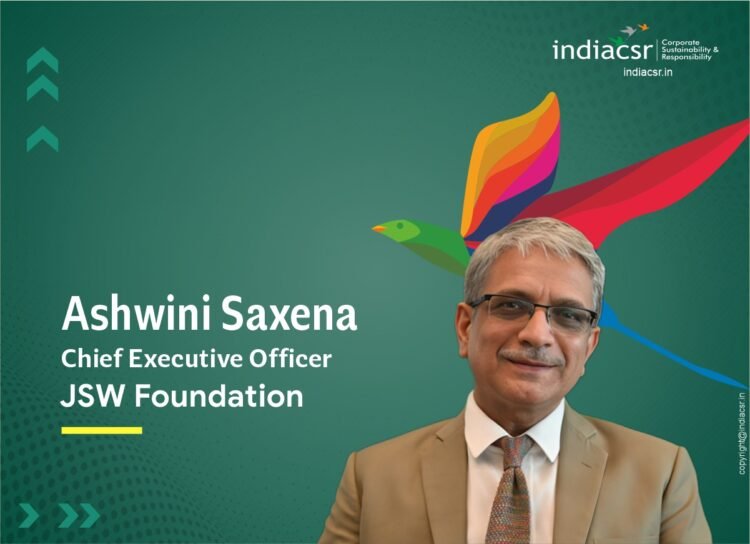
Words Rusen Kumar
The Future of CSR in India with Ashwini Saxena, the Chief Executive Officer of the JSW Foundation.
MUMBAI: In this interview series, Ashwini Saxena, the Chief Executive Officer of the JSW Foundation, delves into the evolution, impact, and future trajectories of Corporate Social Responsibility – CSR in India. Over the past decade, India has seen remarkable progress in its CSR initiatives, fueled by legislative changes and growing corporate awareness. Ashwini Saxena discusses how these changes have influenced businesses, NGOs, and communities, and outlines the potential for CSR to significantly contribute to India’s development goals. With insightful perspectives on mandatory CSR, emerging trends, and the strategic use of technology, this interview, led by Rusen Kumar, Editor of India CSR, sheds light on the complexities and opportunities within India’s CSR landscape.
Evolution and Impact
1. How has the CSR landscape in India evolved over the past decade? What are some of the key milestones and achievements?
Ashwini Saxena: The last decade has witnessed significant strides in the CSR space in the country. The fact that there is a national action plan under formulation for business responsibility and human rights proves that businesses will continue to play a significant role in development and that human rights will be the lens with which all CSR will be evaluated from. The key trends that I can observe are:
a. The amount of CSR expenditure has increased as more and more companies have aligned themselves to the CSR Law and the overall economic growth the country has witnessed.
b. The number of companies that are now carrying out CSR activities and moving on from simple cheque cutting approach has gone up. The overall interest in learning how to do CSR effectively has piqued.
c. Standardisation of activities and general understanding about what is CSR and what is not has also increased and this means that funds will increasingly be utilised more meaningfully.
d. The initial response by governments was about looking at CSR as yet another pot of money but gradually this paradigm is changing and this will further help improve the efficacy of CSR and through it the overall development. While there is an effort to ‘regulate’ CSR through CSR Authorities by various state governments , in my personal view this approach will lead to complications and district and state administrations may have to let go of their biases against private sector in general and to consider them as partners in the development process. Many a times it is shaping up in the right direction.
e. Emphasis is shifting towards what has been the outcome rather than just the outreach so assessment of the CSR work is also a healthy trend to bring in more seriousness and measurement metrics around the subject.
***
2. What has been the impact of mandatory CSR on businesses, NGOs, and communities?
Ashwini Saxena: The moment you make something mandatory, the immediate response is compliance. Compliance is about ticking the boxes. But as the boxes get ticked, then the revelation comes what can be done to leverage this mandatory expenditure for business benefits or instant ‘visibility’ for doing good.
This initial phase is kind of getting over and the idea of ‘social license to operate’ and being able to lead a lasting change is gaining ground. So companies are now looking in what manner can they use CSR as an effective tool for stakeholder management and how they can redefine their “PR” activities or at least align the same with CSR and vice versa. The emphasis is increasing in what all can companies potentially change in a positive manner and move the brand value up.
NGOs have looked at CSR as another potential source of funds for their programs but they have to learn to align to the new metric with which the corporates typically function and measure their work. The belief in process is high in NGOs and usually absent in corporates since they believe only in results. Results and processes are intertwined in my view.
You cant get good results by following a faulty or wrong process and any good process is not good enough if the final outcomes are not as desired. So this disbelief or lack of understanding has to gradually diminish. I am sure it will take time but eventually will happen.
NGOs have been themselves driven by output based targets and have found their capacities quite limited for operating at scale. They haven’t tried this so far so CSR comes as a good opportunity.
Communities may have found a new arsenal that CSR is mandatory and so businesses are going to compulsorily spend funds to meet their obligations but that’s a journey towards distributive justice to some extent. Unfortunately the CSR institutions have traditionally not focused on organising the communities in the fear giving a platform to dissonance.
But you can‘t stop dissonance from emerging up and its better to bring forward sane voices than loud ones which eventually always come up. So how you steer the communities and how you organise them is the key to CSR in my view. Some how communities need to be trained to not just demand but be a part of the decisions with shared responsibilities.
***
3. Have there been any unintended consequences or challenges associated with the current CSR framework?
Ashwini Saxena: The mandatory nature and the punitive measures outlined have also made some sense of paranoia amongst the companies and the ‘risk takers’ are completely averse to try new ideas, try new approaches and this not taking the ‘risk’ is the riskiest thing in my opinion. The audit and accounting firms have usually fanned the risk perceptions and government can certainly do more to win over the trust of the corporates. Just awarding a few and not having a structured and objective dialogue is currently missing.
While CSR is a subject governed by GOI rules and the answer ability is that of the Boards to the Ministry of Corporate Affairs, the eruption of state level agencies, the fund demands and ‘directions’ by the state entities and functionaries is leading to a significant amount of confusion since as per the law government has no role to play in CSR, yet given the regulatory and administrative controls of the governments on the actual business operations, the ‘compliance’ to directions from any quarters and in any manner put the corporates Ina very tight situation in terms of compliances and smooth functioning of the very businesses from which the funds for CSR get generated.
This is my personal observation and experience and while companies may not express this so clearly the pinch is there and certainly needs to be eased if we really appreciate the role of the private sector in the development of the country. Somewhere the government and its constituents have to learn that they are not the only ones concerned about the country’s growth, others are too and need to be brought in and respected for the same.
The insistence and the general pressure on spending every single rupee every year by 31st march and the name and shame game that many agencies also play in the process puts an undue pressure on companies to spend the money some way or the other just to save their brand image and to avoid any action by MCA.
While the law provides for spending over 3 years, no one is really keen to keep that money in an ESCROW account an also be blamed for not being able to spend. Themalpractices and the unscrupulous organisations further add to the agony.
***
Emerging Trends and Opportunities
4. What are some emerging trends in CSR that are likely to shape the future of corporate giving in India?
Ashwini Saxena: Urbanisation is happening at a fast pace so NGOs as well as corporates as well as the opinion makers on CSR need to realign their strategies, yet no compromises on rural india for sure.
Everything will be looked at from the human rights lens so understanding of the same is very necessary.
India is likely to remain a young country for several years from now and so youth related issues will becomes more critical, such as employment, skills, mental resilience, connect with the notion of one nation.
Documentation of actual impact will become more and more critical.
Alignment of CSR and sustainability will have to happen since social and environmental sustenance are closely correlated.
Start-ups and socially inclined business models might replace a large number of NGOs due to their inherent inefficiencies and lack of capability enhancement. The shift is from supporting a cause to supporting solutions, though this will have its own limitations for sure.
CSR is likely become more mainstreamed and more professionalised but if CSR will continue to be treated at sub par than other business functions talent attraction and retention may continue to be an issue. In all likelihood, consulting firms may occupy this space and companies may struggle to get the right talent in-house.
***

5. How can technology be leveraged to enhance the effectiveness and transparency of CSR initiatives?
Ashwini Saxena: Technology needs to deliver on:
- Improved tracking and measurement with more standardised products and offerings
- Cost effective solutions to deliver services at the last mile
- More platforms that can bring in convergence and collaboration
6. What role can collaboration and partnerships play in maximizing the impact of CSR?
Ashwini Saxena: An estimate is that India needs $170 billion every year if all the SDGs have to be fully achieved. So, problems are large sized and no company, however big it may think it is and even the mighty government, can solve this without effective and meaningful collaboration. Convergence is also needed to arrive at jointly owned and agreed upon priorities since the limited resources can only solve a few problems at a time. This prioritisation has to be done with the involvement of all stakeholders and is a tough task for sure.
***
Focus Areas and Strategies:
7. What are some key areas where CSR can make a significant contribution to India’s development goals?
Ashwini Saxena: Health services, livelihoods, rural economic upliftment are some key areas where CSR can be most effective and since these are critical areas for the nation in my view these need to be prioritised to reap the demographic dividend of the country.
***
8. How can companies ensure their CSR initiatives are aligned with the needs of communities and contribute to sustainable development?
Define your priorities, align them to local needs and priorities, align them to the funds that you have and what you can broker from other like minded institutions and government, put a framework and share it for co-ownership and then implement.
***
9. What are some best practices for measuring and reporting the impact of CSR activities?
Ashwini Saxena: Involving people in the process of identification and prioritization of issues, always documenting the ’what if’ scenarios and impact upon them. Measuring regularly and doing course correction as necessary.
***
Looking Ahead
10. What are your hopes and expectations for the future of CSR in India? What needs to be done to ensure its continued growth and effectiveness?
Ashwini Saxena: Hope that some day CSR itself will not be required, expectation that CSR can play a meaningful role till then and what needs to be done is to simply roll up your sleeves, engage the stakeholders and get into action.
***
About the Author
Rusen Kumar is the Managing Editor at India CSR, the largest news platform in India dedicated to Corporate Social Responsibility. With years of experience in journalism, Rusen Kumar has become a prominent voice in CSR discourse, consistently highlighting impactful initiatives and fostering discussions that drive social change and sustainable development across the nation.
*****
Copyrigtht@IndiaCSR






